Online RTI: I believe you have joined our Facebook Free Legal Aid forum or purchased one of our books or resources, and you have been advised to visit this page to Learn and Understand the Right to Information Act in a precise manner and file your own RTI application. If you have not joined our NGO Free Legal Aid Forum, Please join us HERE, and post your complaint. You can also obtain our nonprofit plan and support to file your RTI, First, Second or Final Appeal or RTI Complaint here.
In this blog, I will provide you with a few instructions and advice to keep in mind while pursuing your RTI application. I will not take you in-depth of the RTI act, as that may not be necessary, however, I will provide external resources for your pursuance, If you wish to go in-depth of RTI Act. My goal is to keep it simple, so you find it easy to draft your RTI and subsequent procedure with confidence. I will also provide you RTI formats, for your reference.
Right to Information
Right to Information (RTI) is an act of the Parliament of India which sets out the rules and procedures regarding citizens’ right to information. It replaced the former Freedom of Information Act, 2002. Under the provisions of the RTI Act, any citizen of India may request information from a “public authority” (a body of Government or “instrumentality of State”) which is required to reply expeditiously or within thirty days. In case of a matter involving a petitioner’s life and liberty, the information has to be provided within 48 hours. The Act also requires every public authority to computerize their records for wide dissemination and to proactively publish certain categories of information so that the citizens need minimum recourse to request for information formally. RTI is a fundamental right for every citizen of India. The authorities under the RTI Act 2005 are called quasi-judicial authorities. This act was enacted in order to consolidate the fundamental right in the Indian constitution ‘freedom of speech’. Since RTI is implicit in the Right to Freedom of Speech and Expression under Article 19 of the Indian Constitution, it is an implied fundamental right.
If you want to obtain information from the government department including courts, police departments, local municipal corporations, etc., you can file an RTI application with prescribed fees, and obtain such information. It is important you restrict your question to the facts. I have observed many citizens file an RTI to seek the opinion of the authority and they get no response. You get no opinion from the government on your question, but the information in the form of documents, electronic formats for the act, action, decision, or process done by them. You can not file an RTI against private businesses like Amazon, Flipkart, or any other business. However, you can file an RTI against organization or business who receive substantial fund/grant from the government. Certain information is restricted under RTI to protect national, international interests, and the safety of the people. You can file online RTI with the central government department here, however, with state and local departments, you may need to file RTI through post or courier.
RTI Online Frequently Asked Questions
Sometimes you need to wait till you file an RTI. For Example, someone has filed a police complaint against you, in that matter you need to wait till the police investigation is finished and the police submit a charge sheet to the court or file a closure report. Police do not provide information while the investigation is in progress to ensure the criminal investigation does not tamper. For third party documents lied with the income tax department, you can apply for RTI, however, Income Tax Department writes a letter to the respective concerned party and ask for their consent before they disclose such information.
First RTI Appeal
Sometimes authority, for some unknown or specific reasons, delay response or do not respond in 30 days from the receipt of your RTI application, in that situation, you are required to file a First appeal to the superior of the officer to which you have filed your Right to Information Application. Requesters who are aggrieved by a decision of a PIO can make an APPEAL to a departmental Appellate Authority, who will be an officer senior in rank to the PIO but in the same public authority. When you first file an RTI, you need to address it to “PIO” i.e Public Information officer” followed by the department name and address. Then for the first appeal, you need to Write ” FAA’s” i.e. The First Appellate Authority, followed by the address of the authority. The time limit for filing an Appeal is 30 days from the expiry of the date on which information was to be received by the Applicant or from the date of receipt of such decision. First Appeal is the statutory remedy available to the RTI Applicant when there is no response from the Public Information Officer within a stipulated time limit or the decision of PIO is not satisfactory or the PIO offered/supplied incorrect/misleading information or demanded exorbitant further fee etc.
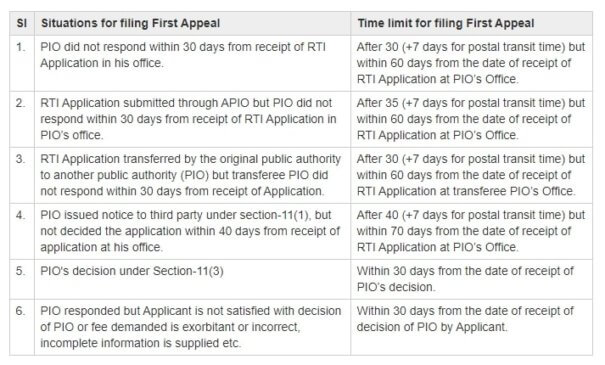
Online RTI First Appeal
The Second RTI Appeal
The Second RTI Appeal (state Level) can be filed within the time limit prescribed under Section 19(3) of the RTI Act i.e. 90 days from FAA’s decision. The complaint needs to be filed within a reasonable period of time. The second appeal can be filed before the State Information Commission, at the state level. You can file your state’s information commission address, links here. Yes, a first appeal before the First Appellate Authority should be filed before moving the second appeal before this Commission. If a second appeal is filed without filing the first appeal, the same is liable to be returned. An applicant can approach the State Commission in the second appeal under section 19 (3) of the RTI Act against the decision of the First Appellate Authority or when no decision is passed by the FAA within the specified time (maximum period of 45 days). You can also appeal when information received is not up to your satisfaction. Therefore, The First Appellate Authority, after hearing from you and the PIO, has to make a decision on whether the PIO made the correct decision. If the order of the First Appellate Authority also does not satisfy you, you can make a second appeal to the State Information Commission.
Alternatively, a COMPLAINT can be made directly to the relevant State/Central Information Commission (After the outcome of First Appeal) where it concerns ANY matter relating to accessing information under the RTI Act, for example, not giving information within a time limit, charging unreasonable fees, denying you a fee waiver despite being a BPL person, destroying a record which you had requested, or making a bad decision about disclosure. You can bypass the departmental Appellate Authority with a complaint, but it is important to call it a ‘complaint’ because otherwise the Information Commission may treat your communication as an appeal, and tell you to go through the departmental Appellate Authority first.
How to file Second Appeal under RTI
The Central Act does not prescribe a time limit for the Information Commission to decide on an appeal and no time limit has yet been included in any of the Appeal Rules which have been prescribed. However, best practice would support a deadline of 30-45 days to dispose of any appeal just like the Appellate Authorities. If an Information Commission decides that your appeal was justified, the Commission will need to give you a written decision. The Information Commission has broad and binding powers to:
(a) Order the public authority to take concrete steps towards meeting its duties under the Act, for example, by providing access to the information you requested, by ordering information be provided in a different form, or by reducing the number of fees you need to pay;
(b) Order the public authority to compensate you for any loss you may have suffered in the process;
(c) Impose penalties on the PIO or any other official who failed in their duties under the Act. If the Information Commission decides that your case is groundless, it will reject your appeal. In either case, the Commission must give notice of its decision to you and the public authority, which should include any right of appeal.
Instead of making an appeal to the Appellate Authority and then the Information Commission, you also have the option of approaching the Information Commission directly and submitting a complaint under section 18(1) of the Act if you are not satisfied with the decision of a PIO or if you think a public authority is failing to comply with its information duties under the Act. This is a particularly useful route if you wish to immediately seek a penalty for the PIO or compensation for yourself. The Appellate Authority does not have the power to order either of these, but Information Commissions do. By approaching the Information Commission directly you will be able to bypass the Appellate Authority, although the lack of time limit for the Information Commission to give its decision is one drawback to this procedure. The Appellate Authority has to give its decision within a maximum of 45 days. It is for you to carefully decide which procedure is best in your case. No fee is required to be paid along with the First/second appeal/complaint.
The decision of the Central Information Commission or State Information Commission, as the case may be, shall be binding.
I advise you to file an RTI to PIO, and If you are not satisfied then approach The First Appellate Authority, followed by State Information Commission. OR, If you are not satisfied with RTI outcome from First Application to PIO, approach State or Central Information Commission for COMPLAINT, and bypass First or Second RTI appeal.
RTI Appeal Versus Complaint
A second appeal under section 19 (3) of the Act is filed against an order of the FAA in a public authority or when the FAA does not make a decision within the specified time. A complaint under section 18 of the Act may be filed directly on the grounds mentioned in sub-section (1) of this section. The main difference between a complaint and a second appeal is that in the case of an appeal, this Commission may pass orders directing the CPIO to provide the requested information to the appellant in appropriate cases whereas such orders cannot be passed while dealing with a complaint.
A complaint may be filed directly in this Commission under section 18 of the RTI Act, by a person:-
(a) who has been unable to submit a request to a Central Public Information Officer either by reason that no such officer has been appointed under the Act, or because the Central Assistant Public Information Officer has refused to accept his or her application for information or appeal under this Act for forwarding the same to the Central Public Information Officer or senior officer specified in subsection (1) of section 19 or this Commission;
(b) who has been refused access to any information requested under this Act;
(c) who has not been given a response to a request for information or access to the information within the time limit specified under this Act;
(d) who has been required to pay an amount of fee which he or she considers unreasonable;
(e) who believes that he or she has been given incomplete, misleading, or false information under this Act; and
(f) in respect of any other matter relating to requesting or obtaining access to records under this Act.
Penalties and Compensation
The Commission has powers to impose a penalty and recommend disciplinary action against Central Public Information Officer (CPIO) under section 20. Section 20 is given below:
Section 20 (1) Where the Central Information Commission or the State Information Commission, as the case may be, at the time of deciding any complaint or appeal is of the opinion that the Central Public Information Officer or the State Public Information Officer, as the case may be, has, without any reasonable cause, refused to receive an application for information or has not furnished information within the time specified under sub-section (1) of section 7 or malafidely denied the request for information or knowingly given incorrect, incomplete or misleading information or destroyed information which was the subject of the request or obstructed in any manner in furnishing the information, it shall impose a penalty of two hundred and fifty rupees each day till the application is received or information is furnished, so however, the total amount of such penalty shall not exceed twenty-five thousand rupees:
Provided that the Central Public Information Officer or the State Public Information Officer, as the case may be, shall be given a reasonable opportunity of being heard before any penalty is imposed on him:
Provided further that the burden of proving that he acted reasonably and diligently shall be on the Central Public Information Officer or the State Public Information Officer, as the case may be.
(2) Where the Central Information Commission or the State Information Commission, as the case may be, at the time of deciding any complaint or appeal is of the opinion that the Central Public Information Officer or the State Public Information Officer, as the case may be, has, without any reasonable cause and persistently, failed to receive an application for information or has not furnished information within the time specified under sub-section (1) of section 7 or malafidely denied the request for information or knowingly given incorrect, incomplete or misleading information or destroyed information which was the subject of the request or obstructed in any manner in furnishing the information, it shall recommend for disciplinary action against the Central Public Information Officer or the State Public Information Officer, as the case may be, under the service rules applicable to him.
It is recommended that the complainant/appellant specifically include a “prayer” or “relief sought” in his Complaint or Second Appeal, in case he wants the CIC or the SIC to impose a penalty under Section 20(1) or recommend disciplinary action under Section 20(2). Similarly, if compensation is sought from the Public Authority, the complainant/appellant should make a specific mention in “prayer” or “relief sought” as well as give justification for seeking compensation and the amount of compensation sought.
RTI Application Stages
- File RTI to PIO
- File First Appeal to FAA (Superior in Rank of PIO)
- File Second Appeal to State/Central Information Commission (Outcome of SIC/CIC is legally binding)
- File RTI Complaint to SIC/CIC (You can bypass point 2 to 3 or follow point 1 to 3 and then proceed as per point number 4)
Read full RTI act in your language here.
RTI Format
RTI Second Appeal (This is PDF Format with instructions, you may need to make necessary changes) (Convert PDF to WORD here.)
RTI Complaint Resource (Sample)
Online RTI
You can get our NGO support to file RTI here.
You get free expert support, pay only expenses, and receive paralegal and expert lawyer researched and drafted questions for RTI. You can also file appeals, complaints with us. It’s hassle-free, and ensure you get, information and redress your concerns. You can file online RTI with us from anywhere in India and even outside of India for the matter pertaining or concerning the government or public authority of India.

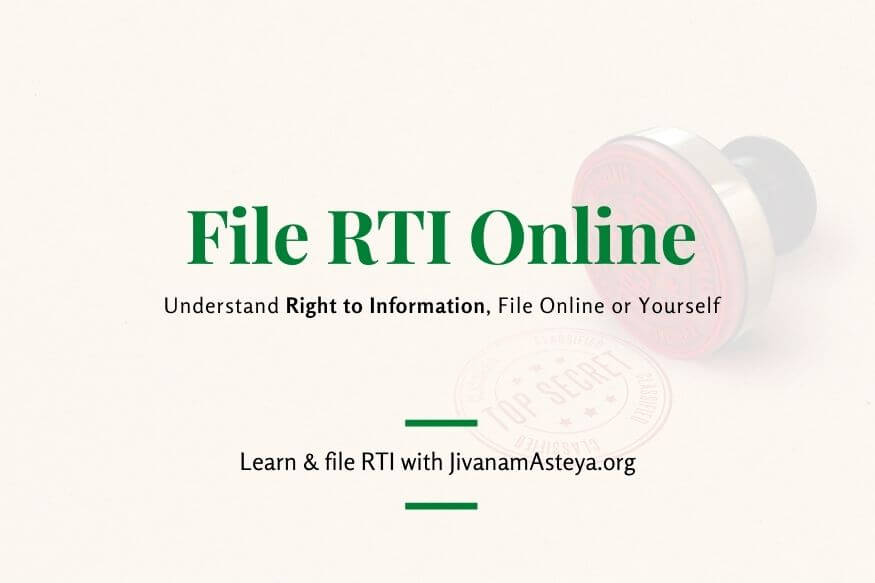
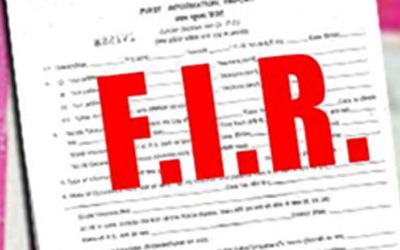
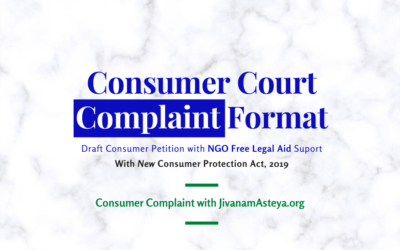
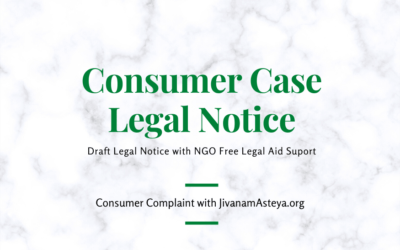
0 Comments